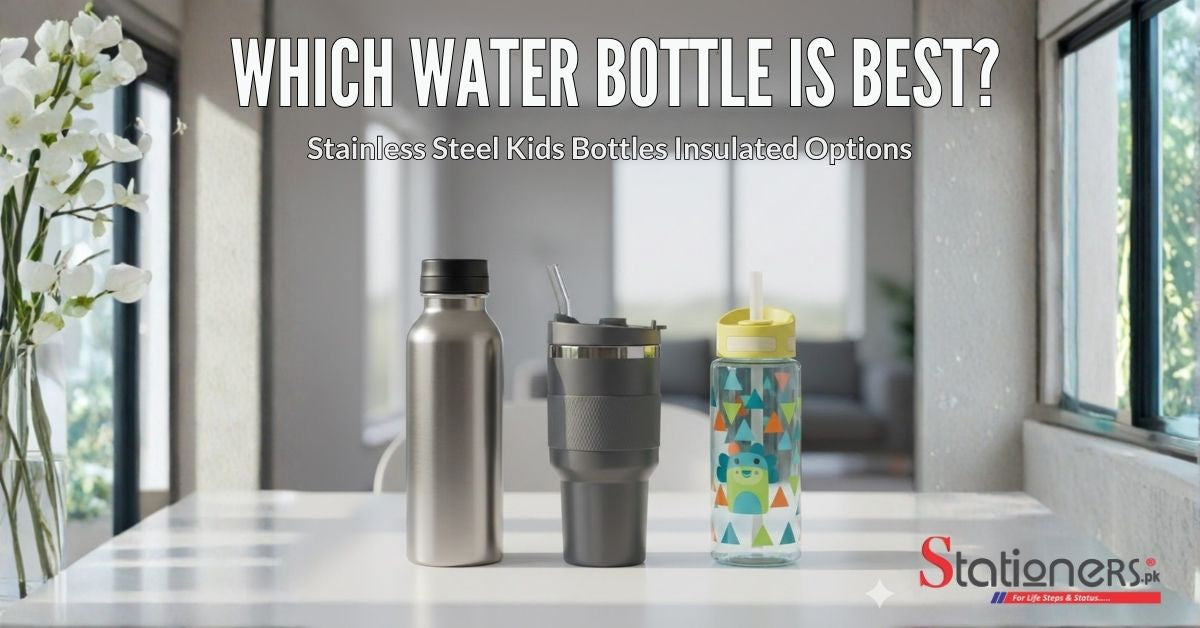Understanding What Makes a Reliable Water Bottle
A reliable water bottle is something you use daily, so it needs to match your lifestyle while keeping hydration simple and convenient. Whether you’re sending your child to school, packing your office bag, or heading out for a long day, the right Water bottle helps maintain freshness, hygiene, and comfort. In Pakistan’s warm climate, people prefer bottles that prevent odor, resist leakage, and keep drinks cool longer.
Popular Water Bottle Materials and Why They Matter
Different materials offer different benefits, and choosing the right one saves you from repeating purchases.
Stainless steel bottles have become popular because they don’t rust, don’t retain smells, and last longer than typical plastic bottles. They work well for office workers, university students, and anyone who wants a safe, long-term option.
For children, lightweight kids water bottles with easy-open lids and spill-proof designs are better because they’re comfortable to use throughout the school day.
Insulated bottles are essential when you need cool water to stay cold for many hours, especially during summers. These bottles often feature double-wall steel construction that keeps temperature stable.
How to Select the Right Water Bottle for Your Routine
Start by identifying your routine. School-going children need bottles that fit smoothly inside bags, complement other school accessories, and remain leakproof even when tossed around. Working professionals prefer bottles that look neat on a desk, feel sturdy in hand, and keep water fresh during long days. People who exercise or travel benefit from bottles with a larger capacity and strong insulation.
Lid type also matters. Flip lids are good for quick drinking, screw-top lids are more secure, and straw lids work best for children who want easy sips. Size is another factor 350–500 ml is ideal for kids, while 750 ml or 1L works better for adults.
What Pakistan’s Users Prefer in Water Bottles
In Pakistan, families commonly choose stainless steel or insulated bottles because they stay safe, durable, and practical. Parents frequently search for break-resistant options for schoolchildren, while older students prefer sleek designs and long-lasting insulation. Many customers now trust online stores after reading authentic product reviews and exploring informative shopping guides. A recent discussion on why Stationers.pk is considered Pakistan’s biggest stationery store highlights how users appreciate variety, genuine quality, and dependable service.
Helping You Decide: Which Bottle Is Right for You?
If durability is your priority, stainless steel bottles offer long-term use and better hygiene. If temperature control matters, insulated bottles keep your water cold in Pakistan’s heat. For children, a lightweight, easy-to-carry design is always the most practical choice. If you value convenience, choose a spill-proof cap. If you prefer something stylish, go for modern prints or minimal stainless designs.
The right bottle is the one that supports your daily routine without adding hassle and with the variety available today, finding the perfect match has never been easier.
FAQs
Which water bottle material is safest for daily use?
Stainless steel and BPA-free plastic are the safest options because they do not release harmful chemicals and are easier to clean.
How long does an insulated water bottle keep drinks cold?
A good insulated bottle keeps water cold for 8–24 hours, depending on the brand and double-wall construction.
What size water bottle is best for school kids?
For most children, 350–500 ml bottles are ideal because they are lightweight, easy to carry, and fit better in school bags.
Do stainless steel bottles keep water colder than plastic?
Yes. Stainless steel maintains temperature longer than plastic and does not heat up quickly, making it better for warm climates.
How do I choose a leakproof bottle for travel or school?
Look for bottles with silicone-sealed lids, secure locking systems, and pressure-tested caps to prevent spills in bags

